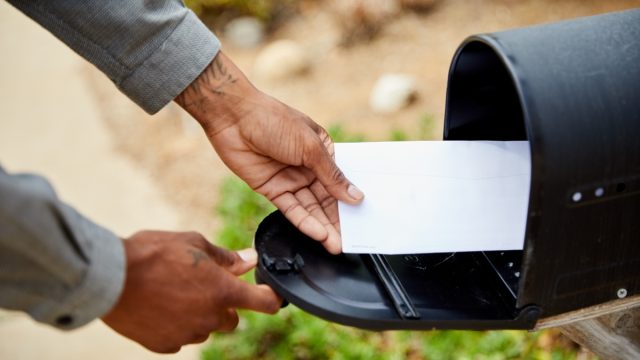The IRS Says These People Must Return Their Stimulus Checks
If you received a stimulus check for this reason, you have to send it back.

By now, most Americans have received their third stimulus check, which was authorized in March and started getting sent out shortly thereafter. Many have already spent their $1,400 payments, especially in light of a pandemic that has left a large number of people in debt and other financial hardships. But is there any reason you might be asked to give that money back? According to the IRS, one group of people must return their stimulus checks. Read on to find out if this applies to you, and for more on future payments, The IRS Says You Could Get Money in July, If You Meet This Requirement.
You must return a third stimulus check if it was mailed to someone who died before 2021.

Extra money can help a lot of families, but if you were sent a stimulus check for a loved one who died before Jan. 1, 2021, they weren't actually eligible to receive the third stimulus check as a result of legislation, AARP explained. While the IRS has worked to make sure checks are not issued or for deceased individuals, some may fall between the cracks. In fact, the IRS accidentally sent out about 1.1 million payments to deceased individuals during the first round of stimulus checks, per the U.S. Government Accountability Office.
If you got a check under that circumstance, you must return it. "A payment won't be issued for someone who has died before Jan. 1, 2021," the agency explained on their website. But if it was, "a payment made to someone who died before they received the payment should be returned to the IRS." And for more on a possible fourth stimulus payment, This Is How Your Fourth Stimulus Check Would Be Different From the Others.
If you were sent a check issued to you and your deceased spouse, you must return their half.

As with the first stimulus payment, joint filers must return a portion of their stimulus payment if they received more money for a spouse who died before 2021. "In that case, return half the payment," the IRS stated on their website. However, if you're unable to cash or deposit a check because it was issued to you and your deceased spouse, you should return the entire check and wait for a new one. "Once the IRS receives and processes the returned payment, an Economic Impact Payment will be reissued to the surviving spouse," the agency said. And for more useful information delivered straight to your inbox, sign up for our daily newsletter.
If your spouse was in the military, you may still get to keep the money.

There are exceptions to this rule, however. According to Forbes, if your spouse died in 2020 and was an active duty U.S. military member at some point in 2020, you (as the surviving spouse) are entitled to receive their $1,400 check if you filed jointly. Also, if your spouse died in 2021 and was eligible for the third stimulus check through all the other requirements, you can keep their portion as well. And for more ways you could be eligible for more money, This Is How You Could Receive More Stimulus Money Right Now.
You can return the check by mailing it back to the IRS.

According to the IRS, you can return a stimulus check by mailing the payment to a specific IRS address based on the state in which the deceased person lived. To mail back a paper check that was not cashed, you should write "Void" in the endorsement section on the back of the check and include a brief explanation as to why you are returning the check. Also make sure not to staple, bend, or paper clip the check.
If you have cashed the paper check or received a payment via direct deposit, you should mail a personal check, money order, or other form of payment made payable to "U.S. Treasury," with 2020EIP and the taxpayer identification number of the recipient written on the check to your specific IRS address. You should also include a brief explanation for why you are returning this money. And for more guidance from the IRS, If You Get an Email From the IRS With These 3 Words, Don't Click on It.





















